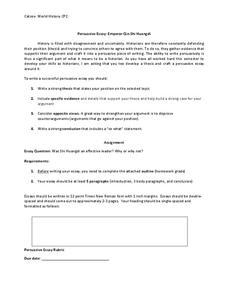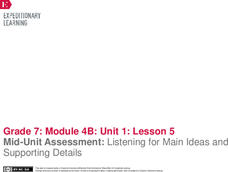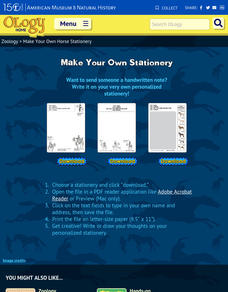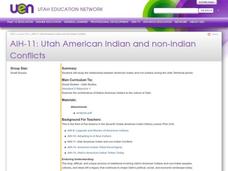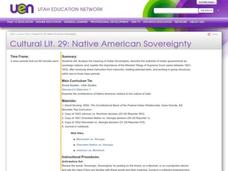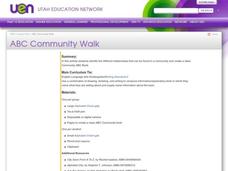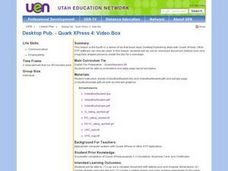Curated OER
Persuasive Essay
Next time you assign your young historians to write a persuasive essay, use this document as a starting point and support them with a rubric, tips for writing a successful persuasive piece, and a general essay outline.
Curated OER
Teaching Julius Caesar: A Differentiated Approach
While the themes of Julius Caesar may appeal to most readers, the act of reading the play can be a challenge. A unit plan related to the popular play by Shakespeare provides lesson plans and activities designed for differentiated...
EngageNY
Mid-Unit Assessment: Listening for Main Ideas and Supporting Details
Pay attention! Scholars view the video"Why College Students Should Start Paying Attention to Water" multiple times to complete a note catcher. After discussing their thoughts with the class, learners watch "The Water Crisis Isn’t...
American Museum of Natural History
Make Your Own Einstein Stationary
No need to be an Einstein for this project! Clever crafters add their name, address, and country to three Einstein-themed templates and create their own, personalized stationary. A great way to stay connected while social distancing.
American Museum of Natural History
Make Your Own Stationary
Revive the art of letter writing with a project that enables class members to craft their own, personalized stationary. Young scholars add their name, address, and country to three different templates that features images of mythic...
American Museum of Natural History
Make Your Own Earth Stationary
Scholars follow five steps to make personalized Earth-themed stationary. Personalization includes name and returns address.
American Museum of Natural History
Make Your Own Dino Stationary
Scholars follow five steps to create dinosaur-themed stationery using basic computer skills.
American Museum of Natural History
Make Your Own Astronomy Stationary
Scholars follow five steps to create personalized, astronomy-themed stationary.
American Museum of Natural History
Make Your Own Horse Stationary
Write a letter on horse-themed stationery. Three pages to choose from showcase a variety of horses and the history of horseback riding.
American Museum of Natural History
Make Your Own Marine Biology Stationary
Encourage letter writing with marine biology-themed stationary. Three versions showcase a variety of underwater creatures.
Curated OER
What Happened Next?
Fifth graders read one short story on their own. After reading, they are given a series of sentences and events from the short story and put them into the correct sequence. To end the lesson, they draw pictures from the story and...
Curated OER
Dr. Seuss: Horton Hears a Who?
Second graders listen to Horton Hears a Who? and complete a study of word cooperation. They group the words into families to see chunking.
Curated OER
Social Studies: A Ticket to Japan
Fourth graders create Venn diagrams to compare and contrast life in the United States and Japan. While the teacher holds up word cards, they decide where to categorize them under Japan, the U.S., or both. As students assemble their...
Curated OER
Utah American Indian and non-Indian Conflicts
Seventh graders examine Utah's struggle for statehood. They study the relationship between American Indian and non-Indians during the Utah Territorial period and determine that the process of statehood involving cultures, and ideas left...
Curated OER
Anasazi Basket Weaving: 0-500 A.D.
Sixth graders study Period 1- Basket Maker 0-500 A.D. of Anasazi Culture. They identify the sequence of history in Anasazi Culture and Indians of the Mesa Verde. They discover American Indian contributions to the world and develop...
Curated OER
Anasazi Pueblo Period: 700-1050 A.D.
Sixth graders study Period 3-Developmental Pueblo 700-1050 A.D., of Anasazi culture. They identify the sequence of history in Colorado and recognize American Indian Contributions to the world. They study Indians of the Mesa Verde and...
Curated OER
U.S. Government & Indian Nations
Pupils explain the Constitutional basis of the Federal Indian relationship. They summarize the Constitutional references to American Indians, and evaluate the importance of the Northwest Ordinance of 1787. They examine Utah's struggle...
Curated OER
Native American Sovereignty
Students analyze the meaning of Indian Sovereignty. They describe the authority of Indian governments as sovereign nations, and explain the importance of the Marshal Trilogy of Supreme Court cases between 1821-1832. They examine the...
Curated OER
ABC Community Walk
Students listen to several stories about cities and different types of communities. They take a walk in their city to identify unique characteristics. They create an alphabet book using people or features of their own community to go...
Curated OER
I Grow
Students describe factors that influence relationships with family and friends. They write a book about themselves using personal knowledge.
Curated OER
Desktop Publishing. - Quark XPress 4: Video Box
Students continue to use the desktop publishing program, QuarkXPress. Individually, they discover how to layout an oversized document. To end the lesson, they use odd shaped pieces to create a box for a videotape and present them to the...
Curated OER
Social Studies: Character and Integrity
Students discover and discuss qualities that build character and integrity. Once they identify the influences involved in labeling and stereotyping, they examine various handouts involved in self-management and increasing their...
Curated OER
Decision Making
Learners describe the decision-making process by listening to books being read aloud and completing worksheets. They write journal entries, complete motivating activities, and participate in a 5 Square Activity. As an assessment, they...


